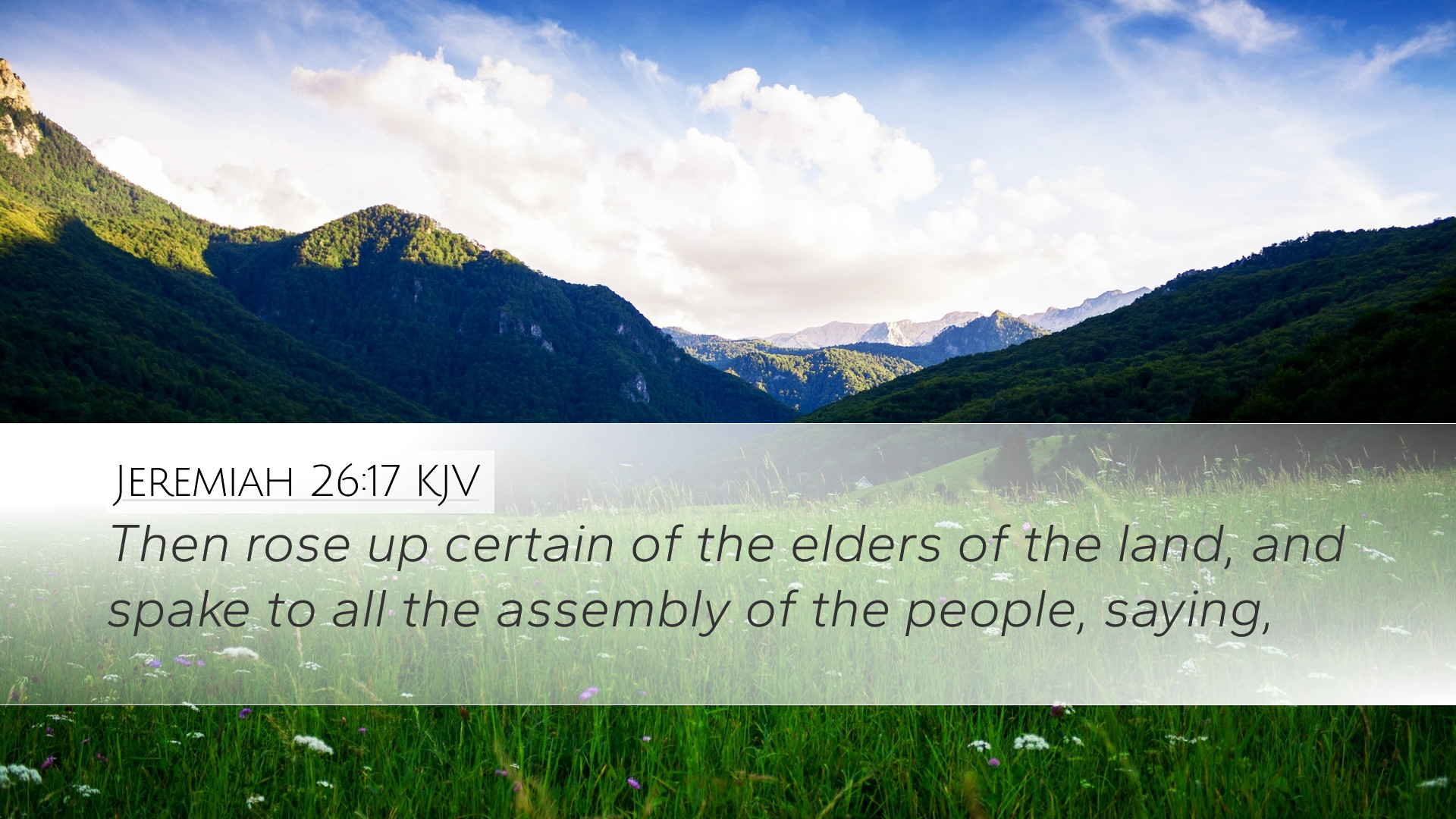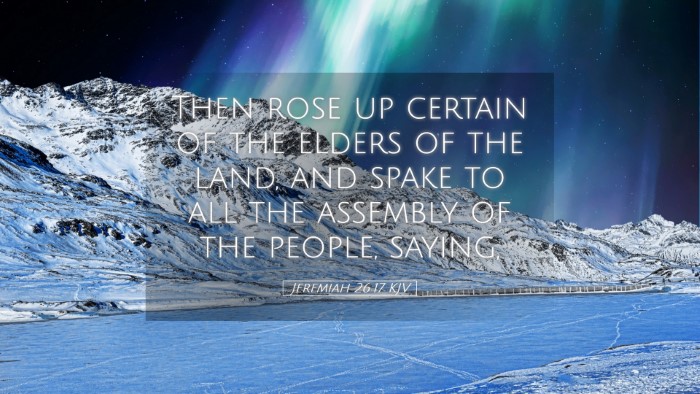Commentary on Jeremiah 26:17
Verse Context: Jeremiah 26:17 reads: “And certain of the elders of the land rose up, and spoke to all the multitude of the people, saying, 'Micah the Morashtite prophesied in the days of Hezekiah king of Judah, and spoke to all the people of Judah, saying, 'Thus says the LORD of hosts, Zion shall be plowed like a field, and Jerusalem shall become heaps, and the mountain of the house as the high places of a forest.'”
Overview
The context surrounding this verse involves Jeremiah's prophecy about the impending destruction of Jerusalem. Faced with hostility from the priests and prophets, Jeremiah's message was one of judgment, contrasting sharply with the prevailing sentiments of peace and security. In this volatile situation, we see how the elders invoke the memory of Micah to defend Jeremiah, illustrating a profound legal and prophetic continuum in Israel's history.
Insights from Commentaries
Matthew Henry
Historical Resonance: Matthew Henry emphasizes the significance of recalling Micah’s prophecy as a means of establishing precedent. He notes that Micah, having preached during a period of moral and spiritual decline, also warned of impending judgment. Henry posits that the elders were aware of how past prophets had faced similar opposition and were striving to uphold the truth amidst the tumult.
Importance of Memory: Henry remarks on the ability of the elders to evoke memories of former voices that had spoken faithfully. By doing so, they reinforced the idea that God's warnings had always been directed towards repentance, not mere threats. The historical infusion serves to encourage the people to recognize the continuity of God’s message throughout history.
Albert Barnes
Legal Defense: Albert Barnes discusses the verse in terms of a defense strategy employed by the elders. They used Micah's example to illustrate that just as Micah was vindicated for his prophetic stance, so too could Jeremiah be justified. Barnes notes that these elders understood the weight of prophecy and the historical patterns of God’s dealings with His people.
Contrast with Contemporary Prophets: Barnes draws attention to the contrast between Micah's real prophecies of judgment and the false prophets of Jeremiah’s day, who preached peace and prosperity. This contrast highlights the spiritual blindness prevalent during Jeremiah's ministry, as the people preferred comforting lies over harsh truths.
Adam Clarke
Prophetic Compilation: Adam Clarke offers insights into the nature of prophetic utterances as shared experiences among faithful leaders. He affirms the authority of the historical prophets and their messages as a means of validating contemporary truth. Clarke suggests that the elders’ citation of Micah was not merely historical but was situational, applying the lessons learned to their current predicament.
Encouragement Amidst Persecution: Clarke posits that this recollection by the elders became a source of encouragement to Jeremiah himself. Recognizing that others had faced persecution for their truth-bearing, Jeremiah could draw strength from knowing he was part of a longstanding tradition of God's spokesmen. Clarke highlights the theme of suffering in righteousness as a recurring element in the life of the prophet.
Theological Implications
This verse and its commentary invite deeper reflection on the role of historical memory in shaping current theological paradigms. The ancient prophets serve not only as historical figures but also as theological voices that resonate across time. The preservation of their messages underlines the timeless nature of God's warnings and the resistance to falsehoods.
Lessons for Today
- The Role of Eldership: Today’s church leadership can learn from the courage exhibited by the elders in defending God's truth.
- Historical Contextualization: It is crucial for theologians and believers to understand their heritage, recognizing how past prophets inform current faith practices and beliefs.
- The Persistence of God’s Message: The enduring nature of God’s instructions compels individuals and communities to heed both historical and contemporary calls to repentance.
- Understanding Opposition: Just as Jeremiah faced opposition, modern believers should remain vigilant against societal pressures that dismiss the calls to holiness and accountability.
Conclusion
The invocation of Micah in Jeremiah 26:17 serves as a testament to the intertwining of history and prophecy, where the messages of the past illuminate the present challenges of faithfulness under fire. Reflecting on this verse provides a solid foundation for pastors, theologians, and students dedicated to the truth of scripture, emphasizing the importance of leaning on God's historical patterns while courageously proclaiming His word.


